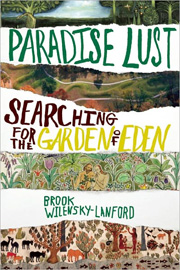By Vicki Cabot, other
It began with a story.
A bit of family lore that lured a bright, young writer on a quest to find out more, and then, as can sometimes happen to very lucky, and very good, first-time authors, to find a story that begat a story and then another and then another and lo and behold, a book. And not just any book, but one that has snared the attention of the book world, snagging huzzahs from critics in such high places as The New York Times and the Wall Street Journal.
So Brook Wilensky-Lanford tells it, as she chats about her recently released Paradise Lust: Searching for the Garden of Eden (Grove Press, $25 hardcover), which maps the journeys of a parade of paradise seekers looking to locate the earthly garden.
“A little kernel got the wheels turning,” she explains from her Jersey City, N.J., condo where she lives with boyfriend Gianmarco Leoncavallo and their two rescued cats, Garlic and Saison, “and I began pulling on the thread.”
The intriguing kernel was a story, as Wilensky-Lanford relates in the book’s prologue, that her great-uncle, William Sherman, an upper East Side Manhattan allergist at Columbia University’s Medical Center, where his father, a member of the National Academy of Sciences, had discovered the structure of vitamin B1, had had a penchant for paradise and sometime in the 1950s hatched a plan to go find it. Alas, she later learned from William’s daughter, Phoebe, the plan was never realized, but it was enough to fire up Wilensky-Lanford’s imagination and inspire her search.
She takes readers along with her from the North Pole to outer Mongolia to Mesopotamia with stops closer to home in places such as Ohio, Missouri and Florida. She relates the well-researched tales of the seekers, beginning with great-uncle William, with a light, often whimsical touch, probing the appeal of the biblical Eden for each and the particular theory of its location. Each pursuit begins with the same passage in Genesis 2:10-14 that puts Eden on the biblical map — “A river flows out of Eden to water the garden, and from there it divides and becomes four branches” — but often ends in an entirely different geographic place.
“The Bible sounds positively nonchalant: If you can pinpoint the four rivers, you can locate paradise,” writes Wilensky-Lanford. But, she observes, of the four rivers mentioned, only two, the Tigris and the Euphrates, can be found; it’s uncertain as to where the others, the Pishon and Gihon, are or were.
Yet even more intriguing than the pursuits of William F. Warren, a Methodist minister and the first president of Boston University or German Assyriologist Friedrich Delitzsch or Chinese revolutionary, businessman and journalist Tse Tsan Tai, each of whom warrants a chapter in the book along with others, is the philosophical scaffolding on which Wilensky-Lanford hangs the entire enterprise. Beginning with great-uncle William, Wilensky-Lanford probes the tension between religion and science that underscores each of the stories and the potent implications of their mix.
She uses her quirky cast of characters to frame a discussion of biblical literalism, delving into the conflict between evolutionists and biblical creationists that still rages, and to make a case for biblical criticism and its multivocality.
“I do not believe that there is any one interpretation of any part of the Bible,” says Wilensky-Lanford. “There are so many translation systems and not every one is as good as every other one. I wanted to line up a whole lot of different stories and show that there are a lot of serious people who went about it in a different way.”
Wilensky-Lanford’s intellectual gravitas really surfaces toward the end of the book where she maps Eden’s — and the Bible’s — place in the current political firmament. Relating the story of science education professor Lee Meadows, who has spent his career trying to reconcile his deep Christian faith with science; visiting the multimillion-dollar Creation Museum in northern Kentucky; and tracking the Mormon migration and search for paradise on earth, Wilensky-Lanford establishes both the immensity of her inquiry and its relevance in today’s world.
Wilensky-Lanford comes by her interests — and her accomplishments — by way of a degree in religion and theater from Wesleyan University and an MFA in nonfiction writing from Columbia University. She’s carved out a niche writing literary essays for Huffington Post, Salon, Triple Canopy, Killing the Buddha and other outlets, working on the side as a freelance copy editor.
Growing up in Maine, literally, says Wilensky-Lanford, in the children’s bookstore owned by her mother, Sheila Wilensky, a former social studies teacher and now assistant editor of the Arizona Jewish Post in Tucson, imbued her with a love of stories, a fascination with history and an abiding idealism, absent any particular religious grounding.
Her mother, justly proud of both her daughter’s and her son’s successes (Ethan Wilensky-Lanford is also a writer), says her children’s involvement in the world of ideas is cause for hope.
“I’m about changing the world, all about changing ourselves,” she says. “I have great faith in them and people like them.”
